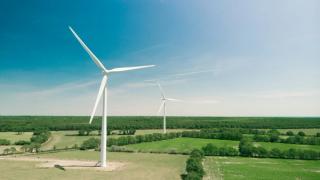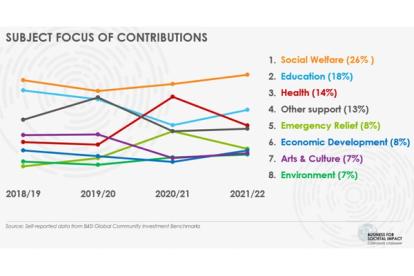
Reforming the NSIP regime: Balancing speed and quality in infrastructure development
by Andy Gregory
View post

This International Women’s Day, and everyday Business for Societal Impact (B4SI) supports companies around the globe to manage and measure their social impact.
In 2023 the United Nations’ theme for International Women’s Day is “Cracking the Code: Innovation for a gender equal future.” And on the 8th of March, we’ll gather in offices and virtual spaces to celebrate the invaluable contributions of women colleagues, friends, and leaders, those in our midst and those who have gone before us. Cupcakes and platitudes aside however, have you stopped to consider how your organisation contributes positively (or otherwise) to the campaign for gender equality?
As stewards of the world’s only global practitioner led social impact framework, we see examples everyday of leadership in social impact across community investment, social procurement, and business innovation. Using a common language and standardised methodology, the B4SI frameworks enable organisations to measure and manage social investments in line with organisational goals. Each year we produce a private, members-only community investment benchmarking tool, which is primarily used to support company decision making internally as well as provide sectoral and geographic insights for strategic planning.
A look back at the last four years of benchmark data (refer to figure 1), reveals telling insights into where companies in the network have been directing community investment funds and how the pandemic played a role in the changes that occurred over this period. Funds that might have otherwise been allocated to education, economic development and arts and culture programs, were diverted into health and social welfare programs throughout the COVID years, leading to a decrease in funds allocated to education.

It should be noted that the opportunity to contribute towards a gender equal world is not confined to one focus-area; the funding which a company allocates specifically to support women and girls can be distributed across any of the B4SI subject focus areas. Education is typically seen as having a particularly powerful effect. According to UNICEF[1], the education of girls specifically, “strengthens economies and reduces inequality. It contributes to more stable, resilient societies that give all individuals – including boys and men – the opportunity to fulfil their potential.” And according to Plan International, investment in girls’ education “creates ripple effects that can drive change for entire communities and countries[2].”
B4SI maintains strategic partnerships[3] with representative groups, industry bodies and academic institutions globally and locally ensuring the network remains informed regarding the latest research, policies and regulations that impact practitioners’ ability to create social impact. Across the 2021 and 2022 B4SI Annual Conferences globally, investment in women and girls and equal access to education was very topical. Julie Reilly OAM, CEO (Chief Executive Officer) of Australians Investing in Women (AIIW), shared that “unless women and girls are intentionally and actively included, the system will unintentionally exclude them”[4]. And similarly, Eve Mahlab AO, Co-Founder and Supporter of AIIW in a recent publication, stated “because of existing inequalities, if we fund men and women equally, women will still be unequal[5]”, reinforcing the importance of gender intentionality in corporate giving and social impact programs through their design and development. Australians Investing in Women’s Guide to Gender-wise Philanthropy[6] is an excellent resource, offering practical tips for introducing a gender-lens to corporate giving and includes inspiring case studies showcasing meaningful change due to the intentional inclusion of women and girls.
James Gomme[7], Director at World Business Council for Sustainable Development shared "We understand rising inequality as a systemic risk that’s as urgent as climate where we need to identify the key levers of business action that can help to offset that risk." Therefore, with an eye to business risks, education to ensure equality within businesses in the future is surely a lever to pull.
B4SI offer companies tools and expert support to measure their impact across community investments, social procurement initiatives and business innovation projects. Through the procurement route to impact, we support businesses with assessing their procurement spend and identifying opportunities to procure resources from a social enterprise which aims to deliver social benefit by employing people with barriers to mainstream employment or from a diverse supplier, such as women owned businesses. There are many examples from across the global B4SI network of 150+ companies[8] creating intentional social impact across the S of ESG. And it would be remiss of us on this special day not to congratulate B4SI member, Mirvac[9] who made history this week, by ranking as the world's most gender equitable company[10] by Equileap, the leading provider of gender equality data and insights[11], for a second consecutive year.
To find out how our network of members are guided and supported by the B4SI team to create social impact through Business Innovation, Social Procurement and/ or Community Investment, contact us via our website here or email us on b4si@corporate-citizenship.com for next steps.
SLR Consulting now manages Business for Societal Impact (B4SI), through its acquisition of Corporate Citizenship in 2021. B4SI is a member-led global network, first established nearly three decades ago. Today we have grown to a thriving network of over 150 businesses sharing a common standard in reporting social impact and connecting regularly to share best practice.
We support businesses to achieve greater societal impact year on year, through the application of our frameworks, standardised methodology and easy to use measurement resources.
[1] https://www.unicef.org/education/girls-education
[2] https://www.plan.org.au/news/education/effects-of-investing-in-girls-education/
[3] https://b4si.net/about/strategic-partnerships/
[4] Sharpening Our Focus on Corporate Giving - Australians Investing in Women (AIIW)
[5] AIIW-Guide-to-Gender-wise-Philanthropy-April-2021web.pdf
[6] AIIW-Guide-to-Gender-wise-Philanthropy-April-2021web.pdf
[7] https://www.wbcsd.org/Overview/About-us/Our-team/Secondments/James-Gomme
[8] https://b4si.net/framework/network/
[10] https://www.mirvac.com/about/news-and-media/mirvac-ranked-as-worlds-most-gender-equitable-company-by-equileap-for-a-second-consecutive-year

by Andy Gregory

by Ashleigh Turner

by Dr. Ben Cook, Eoin Noble